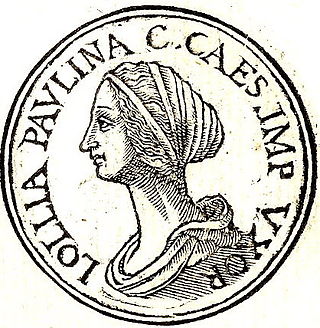Related Research Articles
The name Herennius may refer to:
Quintus Petronius Didius Severus was a Roman who lived in the 2nd century. Severus' family was one of the most prominent and significant families in Midolanensis or Mediolanum.

The gens Didia, or Deidia, as the name is spelled on coins, was a plebeian family at ancient Rome, which first appears in history during the final century of the Republic. According to Cicero, they were novi homines. Titus Didius obtained the consulship in 98 BC, a dignity shared by no other Didii until imperial times.

The gens Lollia was a plebeian family at Rome. Members of the gens do not appear at Rome until the last century of the Republic. The first of the family to obtain the consulship was Marcus Lollius, in 21 BC.
The gens Decia was a plebeian family of high antiquity, which became illustrious in Roman history by the example of its members sacrificing themselves for the preservation of their country. The first of the family known to history was Marcus Decius, chosen as a representative of the plebeians during the secession of 495 BC.

The gens Postumia was a noble patrician family at ancient Rome. Throughout the history of the Republic, the Postumii frequently occupied the chief magistracies of the Roman state, beginning with Publius Postumius Tubertus, consul in 505 BC, the fifth year of the Republic. Although like much of the old Roman aristocracy, the Postumii faded for a time into obscurity under the Empire, individuals bearing the name of Postumius again filled a number of important offices from the second century AD to the end of the Western Empire.
The gens Anicia was a plebeian family at ancient Rome, mentioned first towards the end of the fourth century BC. The first of the Anicii to achieve prominence under the Republic was Lucius Anicius Gallus, who conducted the war against the Illyrians during the Third Macedonian War, in 168 BC.
The gens Caecinia was a plebeian family of Etruscan origin at ancient Rome. Members of this gens are first mentioned in the time of Cicero, and they remained prominent through the first century of the Empire, before fading into obscurity in the time of the Flavian emperors. A family of this name rose to prominence once more at the beginning of the fifth century.
The gens Ceionia or gens Caeionia or the Caeionii family was an ancient Roman senatorial family of imperial times. The first member of the gens to obtain the consulship was Lucius Ceionius Commodus in AD 78. The rise of this family culminated in the elevation of the emperor Lucius Verus, born Lucius Ceionius Commodus, in AD 161.
Marcus Nummius Umbrius Primus Senecio Albinus was a Roman senator who was appointed consul in AD 206 with Lucius Fulvius Gavius Numisius Petronius Aemilianus as his colleague.
Nummius Tuscus was a Roman senator who was appointed consul in AD 295.
Marcus Umbrius Primus was a Roman senator who was appointed suffect consul around AD 185.
Marcus Nummius Albinus was a Roman senator who was appointed consul twice, first as a suffectus sometime around AD 240, and secondly as an ordinarius in AD 263.
Marcus Nummius Tuscus was a Roman senator who was appointed consul in AD 258.
Quintus Pompeius Senecio Sosius Priscus was a Roman senator who was appointed consul during the reign of Marcus Aurelius.

The gens Sosia, occasionally written Sossia, was a plebeian family at ancient Rome. Members of this gens occur in history from the end of the Republic down to the third century AD. The first of the Sosii to attain the consulship was Gaius Sosius in 32 BC, and the family would continue holding various positions in the Roman state until the third century.
The gens Nummia was a plebeian family at ancient Rome. Members of this gens appear almost exclusively under the Empire. During the third century, they frequently obtained the highest offices of the Roman state.
Plautia was a Roman woman of senatorial rank whom Classical scholars believe lived in the late first century and early second century AD. No direct evidence of her existence has yet been found. Ronald Syme comments about her situation, "Plautia exemplifies a common phenomenon in the history of Imperial Rome; a fragment of knowledge rescued from the waters of oblivion, but a figure of consequence in the social and political history of the time."
The gens Umbria, occasionally written Umbreia, was an obscure plebeian family at ancient Rome. Only a few members of this gens are mentioned by Roman writers, but a number are known from inscriptions. Marcus Umbrius Primus was the first to attain the consulship, in the time of Commodus.